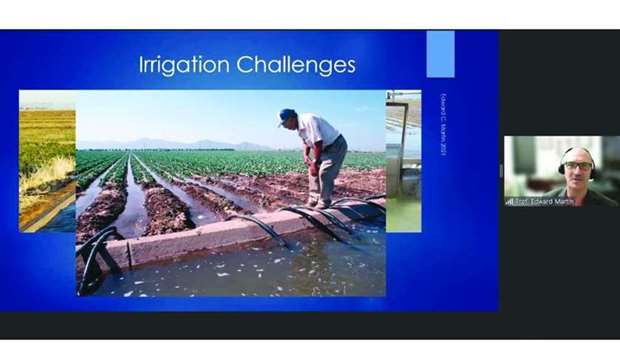Qatar Foundation’s Qur’anic Botanic Garden (QBG), the first garden in the world to exhibit all plant species mentioned in the Holy Qur’an, Hadith, and Sunnah – hosted an online discussion with the University of Arizona that focused on innovative strategies for fostering food security in Qatar and the US Southwest.
The interactive discussion outlined food security related topics, including low-water sustainable agricultural practices, controlled-environment engineering in hot and arid lands, vertical farming innovations, use of renewable energy, as well as the incorporation of traditional local heirloom crops and edible native plants to achieve greater resilience in desert food systems. The webinar attracted participants from 25 countries across the Mena region, Europe, Asia, and North America.
As both regions share common environmental challenges, such as the effects of climate change and growing pressure on resources, particularly on fresh water, Qatar and the US stand to benefit from collaborative working efforts on food security through the joint development and adoption of emerging cutting-edge innovations.
Titled “Fostering Food Security in the Drylands: Innovative Strategies for Qatar and the US Southwest in the Face of Climate Change and Growing Resource Limitations”, the webinar by QBG brought together QBG specialists, as well as experts from the University of Arizona and the Arizona-Sonora Desert Museum in Tucson, and representatives from the Ministry of Municipality and Environment, Qatar University, Agrico, and the Qatar Fertiliser Company.
The webinar was held as part of the Qatar-USA 2021 Year of Culture and the Memorandum of Understanding signed with the University of Arizona earlier in July this year.
Fatima al-Khulaifi, director, QBG, said: “As part of our contributions to the Qatar-US 2021 Year of Culture and in support of both the UN’s Global Strategy for Plant Conservation and Qatar National Vision 2030, we are delighted to have brought together some of Qatar and America’s most distinguished environmental experts to discuss the food security needs of Qatar and the American Southwest, as well as opportunities to collaboratively address them.
Prof Joel Cuello, professor of Agricultural and Biosystems Engineering and director of Global Initiatives for Strategic Agriculture in Drylands, University of Arizona, and vice chair of the International Association for Vertical Farming, said: “The cultural realm transcends the arts and extends to, among myriad things, people’s traditional food ways, their current food systems and how the inextricable link between food security and environmental sustainability is fostered and shepherded by each culture.
“With Qatar and the US Southwest having similar arid/semi-arid environments, our food heritage and challenges also share remarkable parallels, opening doors for our mutual cooperation on the design of resilient and sustainable innovative solutions."
QBG has launched several agricultural and educational campaigns, initiatives, and programmes to encourage community members to start home gardens and preserve plant and natural resources.
The interactive discussion outlined food security related topics, including low-water sustainable agricultural practices, controlled-environment engineering in hot and arid lands, vertical farming innovations, use of renewable energy, as well as the incorporation of traditional local heirloom crops and edible native plants to achieve greater resilience in desert food systems. The webinar attracted participants from 25 countries across the Mena region, Europe, Asia, and North America.
As both regions share common environmental challenges, such as the effects of climate change and growing pressure on resources, particularly on fresh water, Qatar and the US stand to benefit from collaborative working efforts on food security through the joint development and adoption of emerging cutting-edge innovations.
Titled “Fostering Food Security in the Drylands: Innovative Strategies for Qatar and the US Southwest in the Face of Climate Change and Growing Resource Limitations”, the webinar by QBG brought together QBG specialists, as well as experts from the University of Arizona and the Arizona-Sonora Desert Museum in Tucson, and representatives from the Ministry of Municipality and Environment, Qatar University, Agrico, and the Qatar Fertiliser Company.
The webinar was held as part of the Qatar-USA 2021 Year of Culture and the Memorandum of Understanding signed with the University of Arizona earlier in July this year.
Fatima al-Khulaifi, director, QBG, said: “As part of our contributions to the Qatar-US 2021 Year of Culture and in support of both the UN’s Global Strategy for Plant Conservation and Qatar National Vision 2030, we are delighted to have brought together some of Qatar and America’s most distinguished environmental experts to discuss the food security needs of Qatar and the American Southwest, as well as opportunities to collaboratively address them.
Prof Joel Cuello, professor of Agricultural and Biosystems Engineering and director of Global Initiatives for Strategic Agriculture in Drylands, University of Arizona, and vice chair of the International Association for Vertical Farming, said: “The cultural realm transcends the arts and extends to, among myriad things, people’s traditional food ways, their current food systems and how the inextricable link between food security and environmental sustainability is fostered and shepherded by each culture.
“With Qatar and the US Southwest having similar arid/semi-arid environments, our food heritage and challenges also share remarkable parallels, opening doors for our mutual cooperation on the design of resilient and sustainable innovative solutions."
QBG has launched several agricultural and educational campaigns, initiatives, and programmes to encourage community members to start home gardens and preserve plant and natural resources.

